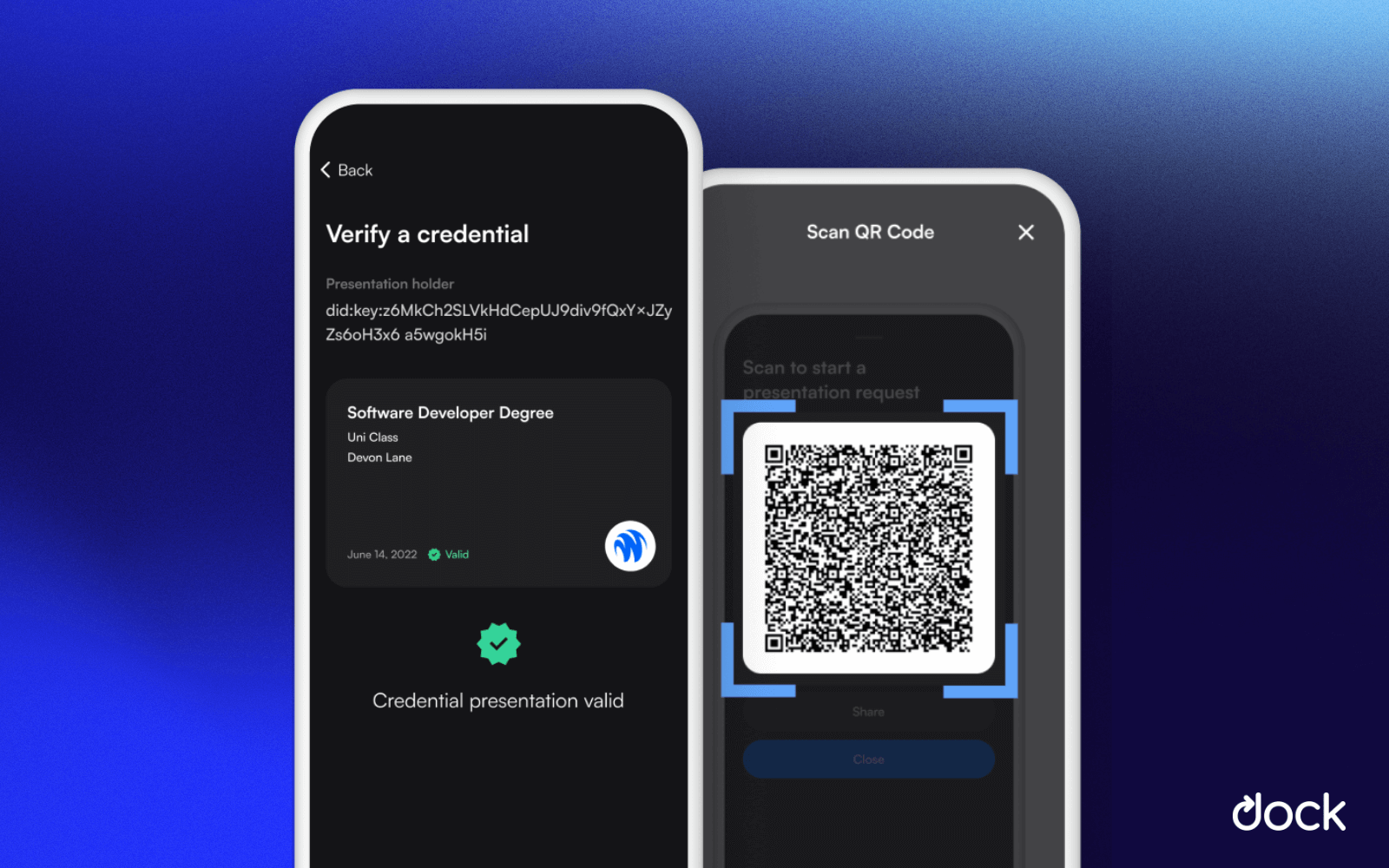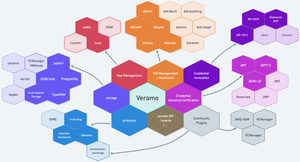Founded in 2017 with a vision of empowering organizations and individuals with verified data, Dock has established itself as a pioneer in the decentralized identity space.
Dock’s Verifiable Credential platform makes any data fraud-proof and instantly verifiable. It comprises the Certs API, the Certs no-code web app, an ID wallet, and a dedicated blockchain.
While the company’s decentralized identity solutions can be implemented for a variety of use cases, Dock is currently focused on identity verification, health and safety, finance, education, and workforce sectors.
Why Decentralized Identity Matters for Organizations and Individuals
In today's digital age, managing and safeguarding identity data is essential. For organizations, decentralized identity represents a transformative approach that enhances data security, improves compliance to data regulations, and reduces operational costs associated with traditional identity management by eliminating the manual verification of physical documents, which speeds up the verification process.
For individuals, decentralized identity enables people to move towards reclaiming control of their data, reducing the risks of data breaches, and simplifying their online interactions.
The State of Verifiable Credential Adoption
A Verifiable Credential is a digital document that proves something about you, such as your identity, qualifications, or membership in a group. It's issued by a trusted source, like a school or government agency, and you can use it online to prove things about yourself. A variety of documents can be issued as Verifiable Credentials including educational certificates, driver’s licenses, passport, and professional licenses.
There is a global shift in the identity sector as private organizations and governments around the world are implementing digital identity initiatives. Examples include:
- Digital driver's license projects (also known as mobile driver's licenses) are implemented in the US, Korea, UK, Australia, Denmark, and the Netherlands among others.
- Electronic identification (eID) systems are becoming the standard in various parts of the world.
- The total addressable market for reusable identity in 2026 is estimated to be somewhere between $133B and $533B globally.
These digital identity initiatives boost the demand for Verifiable Credentials because the technology enables users to prove their identity, qualifications, and claims securely in a privacy-preserving manner to efficiently access a variety of services and products.
How Verifiable Credentials Add Business Value
1. Reduced Organizational Costs
Merit Protocol is a platform that connects employers with financial service companies to enable employees to get better access to financial services. The company integrated Dock’s Verifiable Credential technology to enable employers to issue fraud-proof credentials that can instantly verify employment history and income data. Alex Lyashok, Merit Protocol’s CEO and Co-Founder, anticipates that this will reduce the cost of the loan application process by up to ten times while preserving employees’ privacy.
In terms of reduced data storage expenses, when Dock interviewed Marie Wallace, the Managing Director and Digital Identity Lead at Accenture, she spoke about the benefits she experienced by using a decentralized data architecture with the implementation of IBM’s Digital Health Pass. Digital Health Pass was one of the biggest IBM projects she was involved in with the least number of issues, which she attributes to the decentralized data architecture.
Marie said, “We were issuing millions of these credentials and hundreds of millions of verifications, and our systems were super lightweight. You didn’t have these situations where you were concerned about servers going down or the internet glitching because that just never ever was an issue.”
2. Instant Credential Verification
Traditional verification processes often take days, weeks, or even months. In the US for example, thousands of nurses waited for months, often over 6 months to get their nursing licenses after they completed their program as a result of delays in the verification and issuance processes. Verifiable Credentials enable healthcare employers to instantly verify credentials in seconds which can significantly speed up the hiring process.
Dr. Wendy Charles from BurstIQ, Dock’s customer, explained why she wishes more employers and training institutions would issue Verifiable Credentials.
She had to hire research staff with very specific qualifications and all of the resumes she looked at claimed these qualifications. Because there was no way she could really know if they had the right skills, sometimes she ended up hiring people that were ultimately unqualified. She said, “My greatest concern was that an unqualified person could harm their patients. If there were two candidates that had comparable presentations in their resumes and interviews, I would hire the one with verified credentials.”
3. Efficient Credential Issuance
SEVENmile, an entrepreneurial program in Australia that connects high school students with business owners to learn problem-solving techniques, used Dock to issue hundreds of digital graduation certificates as Verifiable Credentials.
“At SEVENmile Ltd., we believe that the move to ownership of our personal data will help transform how the internet functions and how our data will be protected. We’re applying this philosophy by working with Dock to secure the credentials of students we train,” said Greg Twemlow, SEVENmile’s CEO.
4. Enhanced Privacy and Security With Fraud-Proof Credentials
Verifiable Credentials are designed to enhance privacy by giving individuals full control of their data. With decentralized identity, personal data is securely stored with the individual’s digital identity wallet rather than being scattered across multiple company databases. Users can choose who they share their identity with and to what extent.
Centralized databases are prime targets for hackers because they can access a large amount of user info at once. By decentralizing identity data, the "honeypot" effect is minimized, making large scale breaches less likely.
Gravity Training is a leading training provider of commercial work-at-height solutions in South Africa with international locations in Europe, Africa, the Middle East, and India. The organization uses Dock to eliminate health and safety certificate fraud. Fake health and safety certificates is a big problem in South Africa and creates a huge risk when companies hire unqualified people with high-risk construction work.
Before using Dock’s certification platform, the organization had to manually issue thousands of certificates, which took a lot of time and resources. Employers and inspectors had to contact the issuer directly to ensure the certificates were valid. With Dock, Gravity can now automate the issuance of thousands of fraud-proof certificates a year that can be instantly verified.
5. Enhanced Compliance
In an era where data privacy and security are essential, Verifiable Credentials can play a key part in an organization’s compliance toolbox, by providing a secure and standardized method for handling sensitive information.
While Verifiable Credentials alone don’t necessarily guarantee compliance, they can be used as a tool as part of a larger compliance program and it depends on how they’re implemented. For example, Verifiable Credentials makes it easier for BurstIQ to comply with data regulations including GDPR and HIPAA while making health data verifiable, secure, and portable.
6. Interoperability
Interoperability ensures that our systems, services, and data can seamlessly connect and communicate with one another. In the context of credentials, this means that individuals, organizations, and institutions can exchange verified information and credentials across various platforms, applications, and systems without encountering compatibility issues.
Credentials that follow the W3C Verifiable Credential standard are interoperable, which enhances efficiency, reduces friction, and unlocks new revenue streams for businesses. The international standard establishes a common language and framework for digital credentials.
Dock’s Involvement With DIF
Dock became a DIF member to support the important work of creating specifications that become standards. Different aspects of the technology are often changing and organizations are continuously collaborating to get alignment to enable more standardization in the industry. For example, there is a lack of standards around Zero-Knowledge Proof solutions and DIF is working towards aligning to BBS+ signatures as the format that is the most advanced towards standardization.
Dock CEO Nick Lambert said, “We joined the Decentralized Identity Foundation to be as closely aligned to international standards as possible as we implement solutions for a variety of use cases. Our membership helps us connect with a global network of experts. Together with DIF, we're driving innovation, setting global benchmarks, and ensuring the highest levels of data security for our clients.”







